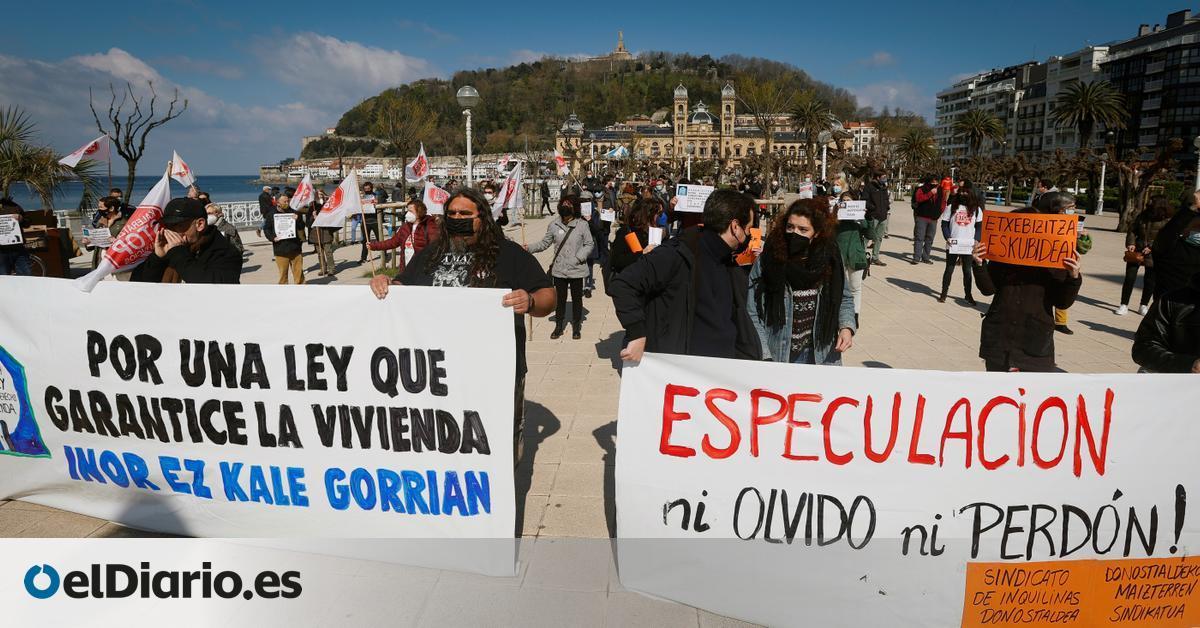
State politics has gained electoral speed with barely a month to go until the campaign of the municipal and regional elections on May 28 begins. Between trips and political events, the government parties and parliamentary partners have been immersed for weeks in the crucial phase of the negotiation of the housing law, with the aim of moving forward before the polls open. Due to parliamentary times, Congress finds it very difficult to approve this text before the campaign begins, but the debate on the first norm that will regulate rents in democracy will force all parties to take a position, including the PP or the formations of the right, who have been opposed to intervening in real estate market prices.
Sánchez ordered to close pension and housing agreements with the legislature partners after the crisis of ‘only yes is yes’
Further
Problems to pay rent have become one of the main concerns for the population in recent years, especially for young people living in big cities. The rental price in Madrid has risen by around 10% in the last year. In cities like Malaga they have seen rents increase by 50% in the last six years. Faced with a scenario like this, a recent Simple Lógica survey for elDiario.es revealed that 66% of the population demands that ceilings be set for rental prices. Express concern for housing has also escalated in the latest CIS barometers.
Although the law that came out of the Council of Ministers establishes a regulatory framework at the state level, housing powers belong to the autonomous communities and town halls and it is these institutions that must decide, once the norm is approved, if they decide to apply the ceilings to the rent that would cover the text. It is for this circumstance that the progressive parties are especially interested in having the norm approved before the campaign, in order to exhibit in the electoral acts between now and May what would be one of the main milestones of the Government.
This same Monday, Podemos again insisted to its coalition partners on the need to reach a consensus as soon as possible so that the law can receive the endorsement of Congress. The co-spokesman for Podemos Pablo Fernández urged the PSOE to push forward with the law since they are “very close” to an agreement. “Rather than focus on talking about internal issues of other political parties,” he said, referring to the conversations between Podemos and Sumar, Fernández asked his partner to “turn in the coming weeks to ensure that housing is a real right for all Spaniards.
Although the law came out of the Council of Ministers in the second round months ago, with the signature of the head of Social Rights and general secretary of Podemos, Ione Belarra, the text needs the votes of the investiture bloc to go ahead in the Lower House and , later, to be ratified in the Senate. It is at this point, in achieving a text that satisfies the PSOE and the PNV, ERC and EH Bildu at the same time, where the difficulties that the negotiations have experienced in recent weeks lie.
The harmony between the negotiating parties is good. In ERC they have seen significant progress for some time and a good climate in the negotiations that, they say, invite optimism. In Podemos, which had lamented some setbacks in the talks in February, they believe that an agreement can be reached shortly that can serve as an important electoral banner for the candidates of the progressive space. The talks progressed in mid-March, with the order of Pedro Sánchez to speed up the negotiations for the pension agreement –reached in those days– and for this law, after weeks of wear and tear due to the negotiation of the ‘only yes’ law is if’.
No matter how quickly the agreement arrives, even if it was this week, parliamentary times would extend its final processing until May. The text has to be approved in parliamentary commission and then travel to the Plenary to finally be definitively approved in the Upper House. This week is a non-working week, as well as the first of May, so there are only two weeks in April available. The electoral campaign begins on Friday, May 12.
A question of fringes that extends over time
The approval of this law has been a question of “fringe” practically since last fall. Already then, the Minister of Transport, Mobility and the Urban Agenda, Raquel Sánchez, assured that the coalition Executive wanted to approve the new legislation “as soon as possible”. “Meetings are being held, approximating positions, I trust that it can be seen materialized in a few weeks,” she said in November.
In January he launched a very similar message, but trying to make it clear that, in terms of housing, the entire Government is heading in the same direction. “More important than the awarding of medals is that we have been doing an enormous job for a long time. For the progressive forces, this law will not be approved in the coming weeks ”, the minister stressed then.
And, a few days ago, he spoke again that the agreement may be close. “We will be able to pass the law. We are going to achieve it ”, he acknowledged at the press conference of the Council of Ministers prior to Easter. “Beyond these last fringes that we are outlining,” he said, “we will be able to reach an agreement.” A need for consensus that now coexists with the electoral calendar, just under a month and a half from the regional and municipal elections.
unfinished business
There are several outstanding points. Among them, how will price control be and where it can be carried out, given that housing is a regional competition and there are already regions, such as Madrid, that have no intention of applying the legislation. Also, how to separate the price of current rental contracts from the CPI progress.
The inflationary spiral of the last year led to the implementation of the rent cap, which many landlords are skipping with the threat of wanting to recover the flat for direct family members. Also, that linking the review of rents and rents to the CPI –as stated in the current legislation– harms tenants. “Obviously, how we regulate the updates in the face of increases in CPI rental prices is one of the issues that are being worked on,” acknowledged Raquel Sánchez last week.
One of the options on the table would be to raise the current ceiling from 2% to 3% but temporarily, until a future rental price index is in place. The problem is that it is yet to define how this index would be made and, in fact, the Executive itself marked in the Bill that a period of 18 months was given to design what the “reference price index system” would be like. Now, that year and a half time could be shortened.
There comes another fringe or problem. That reference price system, unless there are changes in Congress, would only apply in stressed areas, where the rental price has risen at least 5% above the CPI in the last five years. A requirement that, with the inflation of 2022, would again blow up.
In addition, the declaration of a stressed area, according to the current wording, could only be carried out by the autonomous communities, which drastically limits the effectiveness of the Law in territories governed by the PP or by political formations that are not in line with the spirit of the new legislation. . For this reason, the tenant unions demand that the municipalities also have the capacity to declare cities or areas of this type with stressed prices, in order to implement price controls.
Other pending issues are the definition of what is considered a large holder or owner. In the text agreed upon by the Government, there were 10 properties, which could be reduced to five, but maintaining the requirement that the owners be companies, not individuals, which reduces the number of homes on which the income limitation applies.
Also, who has to pay the fees of the agencies that rent the apartments, given that currently it is the owners who hire these services but it is the tenants who pay the commissions. The change would mean that the payment corresponds to the landlords, unless the tenants are the ones who contract the service of the agencies because they need help to find a flat for rent.
Electoral trick for the left, crossroads for the right
Whether the agreement arrives in the coming weeks or if it takes longer than desired by the Government, the debate on the regulation of rents will undoubtedly mark the political debates of next week. With the law already approved, the regional presidents and mayors could also launch to promise the declaration of areas under tension in their respective territories, a point that would leave right-wing parties in a difficult situation, which aspire to reach the electorate concerned about the housing, but who have consistently been reluctant to intervene in the market.
This debate already took place last September, when the central government launched a youth rental voucher that the Executive of Isabel Díaz Ayuso refused to expand. These bonds, of 250 euros per month for a period of 2 years up to a maximum of 6,000 euros per beneficiary, could be increased by 100 euros more charged to the accounts of the autonomous communities. “It is not our model,” said the spokesman for the Ayuso government, Enrique Ossorio, at the time. Two years earlier, with the first agreement of the coalition for a law that would cap rents, the Madrid president’s team dismissed the measure as “populist”, “demagogic” and predicted that it would lead to an increase in rents and the “economy submerged”. The current leader of the PP, Alberto Núñez Feijóo, dismissed the housing bill, when he was still president of the Xunta de Galicia, as “outrage”.
Source: www.eldiario.es

